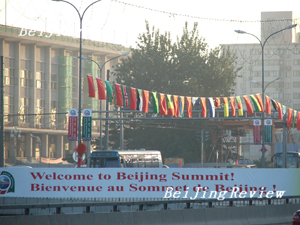
Beijing smoothed down her skirts, dusted off her boots and put on a new coat of makeup for the China-Africa Cooperation Forum that trundled into town during the first week of November. One could have been excused for thinking that Santa had missed his cue and Christmas had come early.
On a trip around a normally very gray pre-winter city, I watched as female municipal workers worked furiously to paint pedestrian overhead bridge railings-I prayed the gray paint was only an undercoat-while others hung huge red lanterns under the bridges. In the tradition of the instant garden that seems distinctive to China, row after row of red and yellow pot plant flowers were carefully placed on every available concrete island on all major city roads. Along Chang'an Avenue, the nation's most famous thoroughfare, lanterns and huge scarlet Chinese knots had been strung up for kilometers, along with endless streams of gold and red tinsel.
Flags of African nations (don't you just love the colors they come in), hung limp in the dead Beijing air, but nonetheless added much-needed pizzazz to the ubiquitous construction crane skyline. Even bus shelters reminded residents that there was a forum going down in our fair city.
And in the land of giant billboards, someone had really gone to town, manufacturing what seemed to be acres of signage and putting these up on the highest rooftops and most-awkward-to-get-to locations around Beijing. The most mysterious part is they had seemingly been erected overnight. One morning they had just magically appeared-just like that, welcoming the delegates in both English and French. Attention to detail, that's what I like.
One billboard in the Central Business District featured a bull elephant in full cry with a caption proclaiming: "Africa the land of myth and miracle." Myth, well mysterious maybe, but miracle, that's stretching it a bit, even for someone who is from Africa. Perhaps what the message was trying to convey was: "Africa the land of mystery and wonder." The elephant in downtown traffic chaos did look kinda cool though.
Even the legendary Silk Street Market got in on the act, scrapping their advertising and displaying a gigantic map of China and Africa with a message calling for peace.
One of the most interesting aspects of the forum's presence was the authorities' decision to ban over half the government cars in Beijing during the forum's duration. This was done in an effort to ensure that African leaders, spread out at various city hotels, would not have to experience any discomfort in the legendary Beijing traffic jams.
Beijing rush hour has evolved into an all- day affair and traffic jams are now an intrinsic part of life. No mystery here, just plain fact.
With 155,936 vehicles registered in the city in the first six months of the year, (almost a thousand cars a day) seven percent of the national total, according to statistics provided by the Beijing Traffic Management Bureau, it brings the number of registered vehicles in Beijing to over 2.7 million. That's a chokeful mass of metal going nowhere, and it has turned the city's roads into the world's biggest parking lot.
As almost every third car in Beijing seemingly is a black government car (work units of the state and Party institutions, military forces and related enterprises) the drop in traffic after this ban was immediately noticeable.
In addition Xinhua reported 80 percent of government vehicles from every suburb and county in Beijing Municipality, and from the Beijing offices of every other province and municipality, would be barred from the city.
Privately owned and company cars were asked to avoid major routes likely to be used by foreign guests during the summit, including Chang'an Avenue, the East and West Second Ring Roads and the airport expressway.
Even taxis got the chop. If they weren't carrying passengers they were banned from entering Chang'an Avenue, the east and west Second Ring Roads and the area around Tian'anmen Square.
In many countries this kind of ban would bring about immediate and vociferous protest. Here it is done to accommodate visitors to the nation's capital with no dissent. Well if there is any grumbling it certainly isn't apparent. I enjoyed the quieter streets too, without the aggressive black vehicles, as I am sure did most other pedestrians and cyclists. And being from Africa I also enjoyed the focus on my continent and seeing my national flag flying up in the streets along with the others.
One thing that did cross my mind was that if this is the effort made for a forum of developing nations, why, just think of the finery that's going to be used for the city's prom night-the 2008 Olympic Games. I guess we ain't seen nothing yet.
The author is a South African living in Beijing.
| 